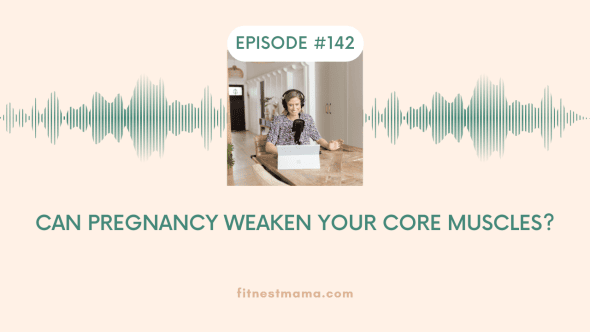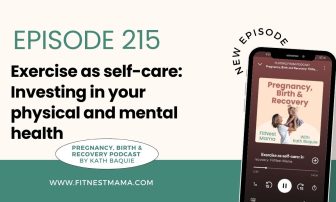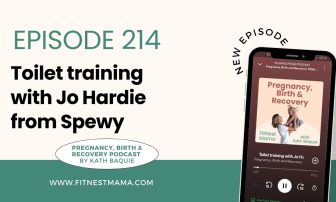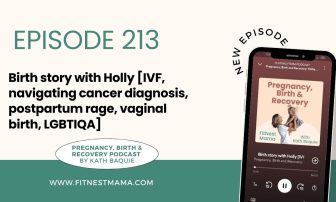In this podcast episode, discover if pregnancy weakens core muscles.
Learn how abdominal and pelvic floor muscles change during pregnancy, the impact on back pain and other issues, and safe ways to strengthen your core.
Explore alternatives to traditional exercises, safety tips, and how to restore core strength post-pregnancy. Join us for expert insights and practical advice on maintaining a strong core throughout your pregnancy journey.
In this episode, we discuss:
– What happens to abdominal muscles and pelvic floor muscles during pregnancy?
– How can my abdominal muscles get strengthened during pregnancy?
– Is it safe to exercise abdominals during pregnancy?
– Some quick safety tips for abdominal muscle exercises and pregnancy.
– How to strengthen weakened abdominal muscles after birth.
During pregnancy, a woman’s body goes through numerous changes, including the stretching and weakening of core muscles. In this blog post, we will explore the effects of pregnancy on the abdominal muscles and pelvic floor muscles. Understanding how pregnancy impacts these muscles is essential for maintaining a healthy and strong core. We will also discuss safe exercise options during pregnancy and postpartum to help regain core strength and support overall well-being.
The Impact of Pregnancy on Abdominal and Pelvic Floor Muscles:
- Abdominal muscles: The rectus abdominis, obliques, and transversus are key muscles in the abdominal region that provide support, stability, and aid in movement. During pregnancy, these muscles stretch and weaken to accommodate the growing baby.
- Pelvic floor muscles: The pelvic floor muscles also experience stretching and bear the weight of the baby during pregnancy. Even in cases of Cesarean birth, the pelvic floor muscles have still undergone significant strain.
- Effects of vaginal birth: Vaginal birth can stretch the pelvic floor muscles by up to 300%. This places additional stress on the core muscles.
- Misalignment and weakened core: Pregnancy causes the core muscles, including the diaphragm, to be pushed out of alignment and weakened. This can lead to issues like pelvic girdle pain and low back pain.
Safe Exercise Options During Pregnancy:
- Abdominal exercises: With approval from a healthcare team, it is safe to exercise the abdominal muscles during pregnancy. However, modifications are necessary, especially if there is diastasis recti (split tummy muscles).
- Alternative workouts: Traditional sit-ups and crunches can be replaced with fitness workouts like Pilates, which focus on functional movements that support day-to-day activities.
- Importance of guidance: Joining programs like Fitness Mama can provide guidance and support for safe abdominal exercises during pregnancy.
Safety Considerations for Abdominal Exercises During Pregnancy:
- Medical approval: Before engaging in any exercise routine during pregnancy, it is crucial to obtain approval from a healthcare professional.
- Listening to your body: Paying attention to your body’s needs and tolerances is essential. If any discomfort or pain arises during exercise, it’s important to modify or stop the activity.
- Avoiding lying down exercises on the back: After 13 weeks of pregnancy, it is advised to avoid lying flat on the back during exercises to prevent reduced blood supply to the fetus.
Recovering and Strengthening the Core After Pregnancy:
- Postnatal rehab: Gradually building up strength through consistent exercise is key in postnatal core rehabilitation. This process supports both the body and mind during the transition to motherhood.
- Trust and suitability: Trusting the exercises and the source providing them is important. Ensuring the exercises are suitable for your stage of postpartum and can be done consistently is crucial for long-term progress.
- Beyond toning abs: Strengthening the core after pregnancy goes beyond toning abs. It helps prevent back pain, regain confidence, and reduces the risk of pelvic health issues.
- Professional guidance: Joining programs like Fitness Mama or seeking professional guidance can provide further support and guidance for postnatal core strengthening.
Pregnancy can weaken core muscles due to the stretching and strain experienced by the abdominal and pelvic floor muscles. However, there are safe and effective ways to support the body during pregnancy and recover afterwards. By following appropriate guidelines, modifying exercises, and seeking professional guidance, women can regain core strength, prevent pain, and enhance overall well-being. Remember, caring for your core is an investment in your future health and quality of life.
Episode Links
Preparing for birth Pelvic health checklist
Free 7 Day Trial Pregnancy Workouts
Free 7 Day Trial Postnatal Workouts
Instagram @fitnestmama
DISCLAIMER:
All information is general in nature and doesn’t substitute individualised assessment, treatment and diagnosis. If you have any questions or concerns please consult your healthcare provider.





